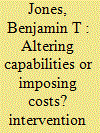| Srl | Item |
| 1 |
ID:
153911


|
|
|
|
|
| Summary/Abstract |
How do military interventions affect the outcome of civil wars? The diversity of military interventions makes it difficult to answer this question; their variation means that they do not affect civil wars in a straightforward way. In particular, strategy and timing play a pivotal role in determining the effect of an intervention. Thus, I isolate three intervention strategies: indirect (bolstering the capabilities of the supported side), direct-conventional (degrading the capabilities of the opposition), and direct-unconventional (imposing costs on the opposition). I evaluate the impact of these strategies on the outcome of civil wars using a dataset of all civil wars from 1944 to 2007. My analysis reveals that the efficacy of intervention strategies varies over time. Third-party support for rebel organizations is most effective during a critical window early in a civil war. In contrast, direct military assistance for the government increases the odds of a government victory only once a civil war becomes protracted. It also reduces the odds of a negotiated outcome to the conflict, whereas indirect support for the government proves most effective early in the war. This work demonstrates that pooling all interventions together risks overlooking important differences in their effects on civil wars. It also carries with it important implications for states considering interventions in civil wars.
|
|
|
|
|
|
|
|
|
|
|
|
|
|
|
|
| 2 |
ID:
193021


|
|
|
|
|
| Summary/Abstract |
This study tests the effect of fake news awareness as an intervention strategy for motivating news verification behaviour among social media users in Nigeria. A quasi-experiment was utilized with 470 participants divided into two groups, comprising the control group, n = 235, and the treatment group, n = 235. Fake news awareness was found to be an effective intervention strategy used to intensify the urgency and need to verify news before sharing. Individuals exposed to fake news awareness campaigns reported a more positive attitude towards news verification, better self-efficacy towards verification and were more concerned about their reputation on social media.
|
|
|
|
|
|
|
|
|
|
|
|
|
|
|
|
| 3 |
ID:
117283


|
|
|
|
|
| Publication |
2013.
|
| Summary/Abstract |
This study investigates intervention strategy in stimulating energy-saving behavior to achieve energy neutral urban development. A tree structure overview of potential interventions classified into three categories is revealed. An integrated behaviour model is developed reflecting the relations between behaviour and influence factors. A latent class model is used to identify segments of local residents who differ regarding their preferences for interventions. Data are collected from a sample of residents in the Eindhoven region of the Netherlands in 2010. The results indicate that social-demographic characteristics, knowledge, motivation and context factors play important roles in energy-saving behaviour. Specifically, four segments of residents in the study area were identified that clearly differed in their preferences of interventions: cost driven residents, conscious residents, ease driven residents and environment minded residents. These findings emphasize that the intervention strategy should be focused on specific target groups to have the right mixture of interventions to achieve effective results on stimulating them to save energy.
|
|
|
|
|
|
|
|
|
|
|
|
|
|
|
|